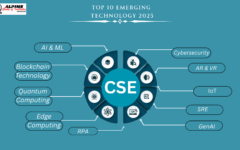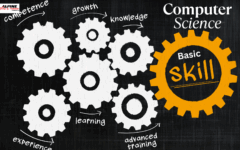Scope After B.Sc. IT (Information Technology) : A Detailed Overview
2025-07-01 11:56Scope After B.Sc. IT (Information Technology) : A Detailed Overview
A Bachelor of Science in Information Technology (B.Sc. IT) is a 3-year undergraduate program designed to impart essential skills in software development, networking, database management, cybersecurity, and information systems. As technology becomes more deeply integrated into every industry, the demand for IT professionals continues to grow—making B.Sc. IT is a valuable qualification.
Job Opportunities After B.Sc. IT
Upon completing B.Sc. IT students can enter various roles in the IT and tech industries. Here are some of the most common entry-level positions:
a. Software Developer / Programmer
- Skills Required: Programming (Java, Python, C++, etc.), software engineering.
- Roles: Develop software applications, maintain codebases, fix bugs.
b. Web Developer
- Skills Required: HTML, CSS, JavaScript, PHP, React, etc.
- Roles: Build and maintain websites and web applications.
c. Network Administrator
- Skills Required: Networking concepts, system administration, security.
- Roles: Manage and troubleshoot network infrastructure.
d. System Analyst
- Skills Required: Analytical skills, understanding of systems design.
- Roles: Analyze and improve IT systems in organizations.
e. Database Administrator (DBA)
- Skills Required: SQL, Oracle, MySQL, database management.
- Roles: Manage, secure, and optimize databases.
f. Technical Support Specialist
- Skills Required: Communication, troubleshooting.
- Roles: Provide IT support to end-users or clients.
g. Cybersecurity Analyst (Entry-Level)
- Skills Required: Basic cybersecurity principles, firewalls, antivirus tools.
- Roles: Monitor systems for threats and assist in maintaining cybersecurity policies.
Higher Studies After B.Sc. IT
Pursuing higher education can enhance career prospects, offer specialization, and open doors to leadership roles.
a. M.Sc. in Information Technology / Computer Science
- Deepens technical knowledge and research skills.
- Good pathway to teaching, research, and specialized IT roles.
b. MCA (Master of Computer Applications)
- Industry-recognized professional degree.
- Emphasizes practical applications in computing.
c. MBA in Information Technology or General Management
- Ideal for those looking to transition into tech management roles.
- Opens career options in project management, IT consulting, and business analysis.
d. Postgraduate Diplomas / Certifications
- Short-term programs in Data Science, AI/ML, Cloud Computing, etc.
- Offered by institutes like NIIT, Coursera, edX, IITs (online), etc.
Certifications That Add Value
Certifications help improve your resume and specialize in niche areas. Some valuable options include:
- CompTIA A+ / Network+
- Cisco Certified Network Associate (CCNA)
- AWS Certified Cloud Practitioner
- Microsoft Azure Fundamentals
- Google IT Support Professional Certificate
- Certified Ethical Hacker (CEH)
- Oracle Certified Associate (OCA)
Emerging & High-Demand Fields
B.Sc. IT graduates can upskill and enter booming technology domains:
| Field | Skills to Learn | Tools & Tech |
| Data Science | Python, R, SQL, ML | Pandas, TensorFlow, Power BI |
| Cybersecurity | Ethical hacking, encryption | Kali Linux, Wireshark |
| Cloud Computing | Virtualization, DevOps | AWS, Azure, GCP |
| Artificial Intelligence & ML | AI algorithms, deep learning | Python, Keras, OpenCV |
| UI/UX Design | Design thinking, prototyping | Figma, Adobe XD |
| Blockchain | Smart contracts, crypto | Solidity, Ethereum |
Industries Hiring B.Sc. IT Graduates
The scope isn’t limited to IT companies alone. Several industries hire B.Sc. IT professionals:
- Information Technology Services
- Banking and Finance
- Healthcare IT
- E-commerce
- Education Technology
- Telecommunications
- Media & Entertainment
- Public Sector / Government
Average Salary
Salaries depend on skills, job role, location, and company.
| Role | Average Starting Salary (INR/year) |
| Software Developer | ₹3.5 – 6 LPA |
| Web Developer | ₹2.5 – 4.5 LPA |
| System Analyst | ₹4 – 7 LPA |
| Network Administrator | ₹3 – 5 LPA |
| Data Analyst (with certification) | ₹4.5 – 8 LPA |
| Cybersecurity Analyst | ₹4 – 7 LPA |
Entrepreneurship Opportunities
With foundational IT knowledge, B.Sc. IT graduates can also explore:
- Starting a tech startup
- Freelancing in web/app development
- Tech consulting
- Creating online courses or content
Study Abroad Options
Graduates can also pursue Master’s degrees internationally in Computer Science, IT, Data Analytics, etc., in countries like:
- USA
- Canada
- UK
- Germany
- Australia
- Ireland
Many universities offer 1–2 year programs post-B.Sc. IT that boost global career opportunities.
Conclusion
The scope after B.Sc. IT is broad and promising. Whether you enter the workforce, pursue higher education, or start your own venture, the IT industry offers multiple growth paths. The key is to keep learning, gain hands-on experience, and specialize in emerging technologies.
B.Sc. IT isn’t just a degree—it’s a launchpad into a tech-driven world with limitless possibilities.









